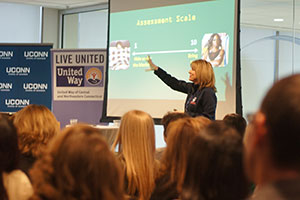Could you give a speech in front of a room of strangers? Would you have the courage to run for elected office? Could you ask for a raise—and stand a good chance of getting it?
Those were some of the questions that executive coach, lecturer and author Barbara Roche asked more than 100 people during a program titled, “Women, Wisdom and Worth.”
Roche’s specialty is helping people advance their careers by capitalizing on their strengths and developing the confidence to explore and pursue new challenges. She is the author of “Commit to Confidence,” a book designed to help women “step up and stand out.”
Her sold-out March 9 presentation at the Graduate Business Learning Center in downtown Hartford was co-sponsored by the UConn School of Business, the UConn Women’s MBA Association, and the United Way.
The audience warmed to Roche immediately when she stepped to the podium wearing a UConn warm-up jacket, with a whistle around her neck, and told everyone to call her “Coach Gen-a” in a nod to women’s basketball coach Geno Auriemma. She then turned on some music and asked everyone to get up and dance.
With the audience fully awake and engaged, the program turned more serious. Roche, who teaches leadership communication at the University of Pennsylvania’s Wharton School of Business, asked participants to identify, and share with others, their “core strengths” from a list of dozens of attributes. These, she said, will help you in times of career distress. They should be the source of confidence, and confidence is the cornerstone of success, she said.
She encouraged the audience to focus on the aspects of their careers that they find invigorating, satisfying, and that they wouldn’t be willing to eliminate.
Oprah Winfrey, Bill Clinton, Nelson Mandela and Meryl Streep are examples of people who have finely tuned strength and confidence and have used the combination to propel themselves to great success.
“When you have a crisis of confidence, say you’re in a meeting with your boss’ boss, you can call on your signature strength to carry you through,” she said.
Later on during her presentation, she told the audience to imagine filling three buckets: the first with the skills and traits and mindset that would get you hired; the second is a list of distinctive skills, those that really make you stand out; and the last is reserved for competitive advantage skills, which are rare knowledge and expertise. For example, someone may have software design skills in the first bucket, leadership skills in the second, and strategic thinking in the last bucket. By knowing your strengths, you are in the best position to find and excel at your work, she said.
Many talented women undermine themselves by using “mitigated speech,” Roche said. Instead of directly stating their views, they add phrases such as “I think,” “I could,” “I feel,” or “maybe, sort of, and kind of.”
She recalled coaching a professional woman who, when asked her opinion in an important business meeting, said: “Well, I have just a teeny, tiny thing to add.” Although she was an important associate, her demeanor was so weak that it negated the information she needed to convey.
Using mitigated speech makes a speaker sound weak, unsure and indecisive, she said. Some of this tendency may reflect the way girls are socialized, to be nice and inclusive rather than powerful and decisive, she said. She encouraged women to be aware of their speech choices and to ask a trusted co-worker to offer honest feedback about their presentation style.
Whether hiring a new employee or voting for a candidate, people look for someone who has has grace under fire, is decisive, authentic, has an inspiring vision and a stellar reputation, she noted.
Another stumbling block to success is distorted thinking, Roche said. Often employees will take a criticism of their work as a personal criticism, blame others, or ‘catastrophize’ a situation, she said. To compensate, it is best to recognize an unwanted or unproductive pattern, refrain from using it, relax and resolve the issue, she said.
“What can you do to prevent the spiral when you think something is too hard, too scary, too awful?,” she asked. The answer, she said, is to remind yourself of your core strengths and push forward.
When asked why more women don’t make it to the CEO office, Roche noted that a recent study found there are more CEOs named John than there are women CEOs.
“Clearly we have a problem,” she said. She urged women to find mentors, who will teach them new skills, and sponsors, who will advocate for them to get promoted.
“It’s not about women being more like men,” she said. “If you’re commanding and powerful and you know your personal strengths, and you avoid distorted thinking and non-mitigating language, you are going to be more successful.”
She urged the audience to embrace their power, strive for professional and personal happiness, to have a strong presence and to know what they want out of life. She also asked everyone in the audience–which included many MBA candidates–to serve as a sponsor to at least one woman employee once they reach a high-status position themselves.
